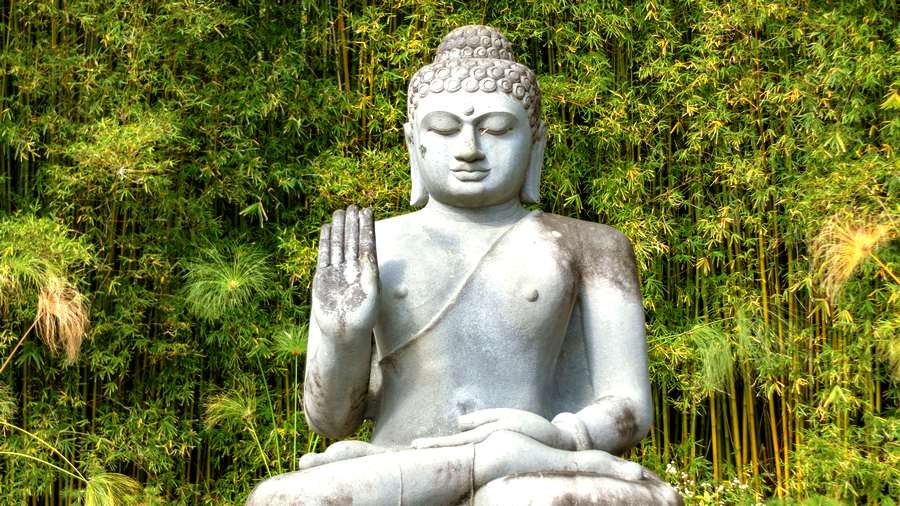Then, in the morning, a number of bhikkhus dressed and, taking their bowls and robes, entered Savatthī for alms. Then it occurred to them: “It is still too early to walk for alms in Savatthī. Let us go to the park of the wanderers of other sects.”
Then those bhikkhus went to the park of the wanderers of other sects. They exchanged greetings with those wanderers and, when they had concluded their greetings and cordial talk, sat down to one side. The wanderers then said to them: “Friends, the ascetic Gotama teaches the Dhamma to his disciples thus: ‘Come, bhikkhus, abandon the five hindrances, the corruptions of the mind that weaken wisdom, and develop correctly the seven factors of enlightenment.’ We too teach the Dhamma to our disciples thus: ‘Come, friends, abandon the five hindrances, the corruptions of the mind that weaken wisdom, and develop correctly the seven factors of enlightenment.’ So, friends, what here is the distinction, the disparity, the difference between the ascetic Gotama and us, that is, regarding the one Dhamma teaching and the other, regarding the one manner of instruction and the other?”
Then those bhikkhus neither delighted in nor rejected the statement of those wanderers. Without delighting in it, without rejecting it, they rose from their seats and left, thinking, “We shall learn the meaning of this statement in the presence of the Blessed One.”
Then, when those bhikkhus had walked for alms in Savatthī and had returned from the alms round, after their meal they approached the Blessed One. Having paid homage to him, they sat down to one side and reported to him the entire discussion between those wanderers and themselves.
The Blessed One said:
“Bhikkhus, when wanderers of other sects speak thus, they should be asked: ‘Friends, when the mind becomes sluggish, which factors of enlightenment is it untimely to develop on that occasion, and which factors of enlightenment is it timely to develop on that occasion? Then, friends, when the mind becomes excited, which factors of enlightenment is it untimely to develop on that occasion, and which factors of enlightenment is it timely to develop on that occasion?’ Being asked thus, those wanderers would not be able to reply and, further, they would meet with vexation. For what reason? Because that would not be within their domain. I do not see anyone, bhikkhus, in this world with its devas, Mara, and Brahma, in this generation with its ascetics and brahmins, its devas and humans, who could satisfy the mind with an answer to these questions except the Tathagata or a disciple of the Tathagata or one who has heard it from them.
[i. The sluggish mind: untimely]
“On an occasion, bhikkhus, when the mind becomes sluggish, it is untimely to develop the enlightenment factor of tranquillity, the enlightenment factor of concentration, and the enlightenment factor of equanimity. For what reason? Because the mind is sluggish, bhikkhus, and it is difficult to arouse it with those things.
“Suppose, bhikkhus, a man wants to make a small fire flare up. If he throws wet grass, wet cowdung, and wet timber into it, sprays it with water, and scatters soil over it, would he be able to make that small fire flare up?”
“No, venerable sir.”
“So too, bhikkhus, on an occasion when the mind becomes sluggish, it is untimely to develop the enlightenment factor of tranquillity, the enlightenment factor of concentration, and the enlightenment factor of equanimity. For what reason? Because the mind is sluggish, bhikkhus, and it is difficult to arouse it with those things.
[ii. The sluggish mind: timely]
“On an occasion, bhikkhus, when the mind becomes sluggish, it is timely to develop the enlightenment factor of discrimination of states, the enlightenment factor of energy, and the enlightenment factor of rapture. For what reason? Because the mind is sluggish, bhikkhus, and it is easy to arouse it with those things.
“Suppose, bhikkhus, a man wants to make a small fire flare up. If he throws dry grass, dry cowdung, and dry timber into it, blows on it, and does not scatter soil over it, would he be able to make that small fire flare up?”
“Yes, venerable sir.”
“So too, bhikkhus, on an occasion when the mind becomes sluggish, it is timely to develop the enlightenment factor of discrimination of states, the enlightenment factor of energy, and the enlightenment factor of rapture. For what reason? Because the mind is sluggish, bhikkhus, and it is easy to arouse it with those things.
[iii. The excited mind: untimely]
“On an occasion, bhikkhus, when the mind becomes excited, it is untimely to develop the enlightenment factor of discrimination of states, the enlightenment factor of energy, and the enlightenment factor of rapture. For what reason? Because the mind is excited, bhikkhus, and it is difficult to calm it down with those things.
“Suppose, bhikkhus, a man wants to extinguish a great bonfire. If he throws dry grass, dry cowdung, and dry timber into it, blows on it, and does not scatter soil over it, would he be able to extinguish that great bonfire?”
“No, venerable sir.”
“So too, bhikkhus, on an occasion when the mind becomes excited, it is untimely to develop the enlightenment factor of discrimination of states, the enlightenment factor of energy, and the enlightenment factor of rapture. For what reason? Because the mind is excited, bhikkhus, and it is difficult to calm it down with those things.
[iv. The excited mind: timely]
“On an occasion, bhikkhus, when the mind becomes excited, it is timely to develop the enlightenment factor of tranquillity, the enlightenment factor of concentration, and the enlightenment factor of equanimity. For what reason? Because the mind is excited, bhikkhus, and it is easy to calm it down with those things.
“Suppose, bhikkhus, a man wants to extinguish a great bonfire. If he throws wet grass, wet cowdung, and wet timber into it, sprays it with water, and scatters soil over it, would he be able to extinguish that great bonfire?”
“Yes, venerable sir.”
“So too, bhikkhus, on an occasion when the mind becomes excited, it is timely to develop the enlightenment factor of tranquillity, the enlightenment factor of concentration, and the enlightenment factor of equanimity. For what reason? Because the mind is excited, bhikkhus, and it is easy to calm it down with those things.
“But mindfulness, bhikkhus, I say is always useful.”
Read this translation of Saṁyutta Nikāya 46.53 Aggisutta: Fire by Bhikkhu Bodhi on SuttaCentral.net. Or read a different translation on SuttaCentral.net or DhammaTalks.org. Or listen on PaliAudio.com or SC-Voice.net. Or explore the Pali on DigitalPaliReader.online.
Or read a translation in Deutsch, বাংলা, Español, Français, Bahasa Indonesia, Italiano, 日本語, မြန်မာဘာသာ, Norsk, Português, Русский, සිංහල, ไทย, Tiếng Việt, or 汉语. Learn how to find your language.










